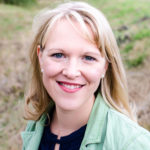Somewhere in my late twenties or early thirties, I realized I didn’t have a clue what I was doing.
If you know my story, this might surprise you. I came to faith early in life, grew up in a Christian home, attended Christian college, was faithful in church, and eventually married a man headed to career ministry. To look at my life on paper, I had made good choices, the kind that ensure future success.
But then life hit. Troubles at church. A season of un- and under-employment. Multiples moves and job transitions. Relationship difficulties. The good life that I had expected — that I thought was mine because of my good choices — was evaporating before my very eyes. Worse still, I didn’t know what to do about it. I found myself facing dilemmas that didn’t have easy answers, and I felt completely unprepared to find them. How do you make a good choice when you don’t even know what “good” looks like? What happens when black and white merge into a foggy gray?
Ten years into adulthood, I discovered that, despite a litany of “good” choices, I really wasn’t a very discerning person after all.
What Discernment Isn’t
There’s a lot of confusion about discernment, especially among Christians. For some of us, discernment is a defense mechanism. People who take this approach to decision making often end up with long lists of “don’ts.” Don’t go there. Don’t watch this. Don’t drink that. If you just stay within certain boundaries, they say, life will be good and happy. But like I learned — like you may already know — life isn’t a set of true and false questions. It’s more like an essay question, requiring answers that are nuanced and layered.
Beyond this, we can’t simply stay away from bad things, because we take ourselves with us everywhere we go. We are flawed human beings who too often make our choices out of fear, egoism and self-preservation. On top of that, we’re affected by the choices of people around us who are also flawed human beings. The idea that we can somehow escape evil in this broken world is naïve and simplistic.
For other people, discernment means having a “sixth sense” about a situation. When you need to make a decision, you’ll just know. Maybe you’ll feel uneasy or maybe you’ll “have peace.” Depending on what your gut tells you, you’ll know what the right choice is. The problem with this approach to decision making is that our emotions are notoriously unpredictable and easily influenced. How do you know whether that sick feeling in the pit of your stomach is discernment and not just the start of the flu? How can you tell the difference between a true call to the mission field and natural Christian empathy for the lost?
Still others approach discernment as a kind of secret, hidden knowledge that only a select few can access. Such people claim to know the “true” motive behind a message or event. They have insider information (that no one else seems to have) about everything from theology to medicine to food to politics. They are often suspicious of experts and embrace conspiracy theories. Questioning or doubting them only serves to reinforce their own sense of discernment. After all, they tell us, “Narrow is the way and few there be that find it.”
The problem with all of these approaches to discernment is that they rest on our ability, emotions and intelligence. They center us in the decision making process. Proverbs 1:7 challenges this mindset when it says that “the fear of the Lord is the beginning of knowledge; fools despise wisdom and discipline.” Besides directing us to God as the source of wisdom, this verse underscores the fact that wisdom comes from outside us. None of us are so wise, so intelligent, or so capable as to be able to make good choices on our own.
In many ways, the first step to discernment is recognizing how much you don’t know and how much you need help. It means coming to the end of yourself and being willing to seek the One who is all-knowing and all-wise. And when you do, when you come to God seeking wisdom, James 1:5 promises that He will give it to you generously.
But it will also come in a way that might surprise you.
Discernment Seeks Goodness
In Philippians 4, Paul echoes Solomon and James, encouraging us to take our questions to God. He writes, “In every situation, by prayer and petition, with thanksgiving, present your requests to God,” promising that God’s peace would transcend our understanding and guard our minds and hearts. But then he continues. After telling us to seek God’s help, Paul tells us to seek goodness.
Finally, brothers and sisters, whatever is true, whatever is noble, whatever is right, whatever is pure, whatever is lovely, whatever is admirable—if anything is excellent or praiseworthy — think about such things.
Beyond being a kind of grid, these virtues reveal something profound about discernment. We’re called to play offense. We’re called to proactively seek things and people that reflect God’s character. And by using the word “whatever,” Paul directs us out into the world beyond man-made fences and safe spaces. Practically speaking, this means that we weigh every decision, every opportunity, everything we choose to take into our lives against the standard of His character.
Perhaps even more surprisingly, when we seek goodness, we end up changed in the process. In common speech, having a discerning eye or a discerning palette simply means having the ability to spot goodness. A celebrity chef can taste a sauce and immediately know what’s missing. An art appraiser can sort through boxes and boxes of junk and recognize what’s valuable and what’s not. So, too, developing discernment as Christians means developing an instinct for goodness and virtue so you can spot it immediately. And when it’s absent, you’ll know that, too. In this sense, discernment is about more than learning to make the right choices. It’s about becoming the right kind of people — people whose minds have been changed to think like their God. People who are naturally drawn to goodness.
The fact that goodness changes us is why Paul links discernment to having our minds renewed in Romans 12:1-2:
Do not conform to the pattern of this world, but be transformed by the renewing of your mind. Then you will be able to test and approve what God’s will is — his good, pleasing and perfect will.
When we set our minds and hearts on things that are true, honorable, just, pure, lovely and of good report, the Holy Spirit uses the process to change the way we think about ourselves and the world around us. When we seek truth, it uncovers our own lack of truthfulness. When we seek justice, it reveals the ways we’re tempted to act unjustly. And when we pursue beauty, it shows us how quickly we opt for pragmatism, sacrificing the eternal for the immediate. All of this while directing us back to the One who is true, honorable, just, pure, lovely, and of good report himself.
The Good Life
Life hasn’t gotten any easier since I reexamined the way I make decisions. In some ways, it’s gotten more complicated. Every day I face questions about relationships, what I’m going to read, who I’m going to listen to, whether I should take this job or that one.
As I test and evaluate what I take into my life, I find myself practicing discernment in a very literal way. Measuring all things by the standard of God’s character is sanctifying me in ways that hiding away or relying on my own intelligence never could.
For example, when I’m scrolling through my social media feed and I read an article that prompts an emotionally negative response, I’m learning to pause long enough to evaluate that emotion before acting on it. (You know, before automatically commenting or simply reposting a popular meme.) Because I’m learning to measure all things by God’s nature — and not my own — I’m learning to ask questions like:
Is this article true? Can the facts be confirmed?
Does it honor the dignity of other people?
Is my response to this post just or am I unfairly biased?
Is the message pure or does it use manipulative language and images?
If I share it, will it add beauty and goodness to the world?
As I ask these kinds of questions, my own motives come under evaluation too. It might feel good in the moment to repost a meme that mocks my political or philosophical enemy, but is it truly good? Does it measure up to God’s standard of goodness?
Sometimes, the decisions I have to make are more significant than what I share on social media. But even when they are, the same process holds true. Whether I’m deciding to take on a new job or put an end to a relationship, I must practice discernment. I must do the work of evaluating my own motives and reasoning by the grid of Philippians 4:8.
Have I looked at the facts or am I simply acting on emotion? What is true about this situation?
Am I honoring the advice of those who have more experience than I do?
Would this decision move me toward righteous living and promote justice?
Are my motives impure or are they mixed? Am I manipulating others? Am I being manipulated?
How will this decision promote beauty and goodness in the world?
In the end, I don’t always make the right decision, but even then, I find God’s goodness ready and waiting to guide me home. And slowly but surely, I’m maturing. Slowly but surely, I’m growing. Or as Hebrews 5:14 puts it, my senses are being trained by constant use to distinguish good from evil.
Describing God’s promise of discernment, Solomon writes, “For the Lord gives wisdom; from his mouth come knowledge and understanding. He stores up success for the upright; he is a shield for those who live with integrity” (Prov. 2:6–7). I used to think my “good” choices would make me a person of integrity and bring me success. Today, I know that God isn’t interested in our good decisions or behavior so much as He wants to display His goodness in and through us. He wants to change us. He wants to make us wise. And as we seek Him, He will do just that, making us people who look and act like Him — people who can discern all that’s good.
Copyright 2018 Hannah Anderson. All rights reserved.











